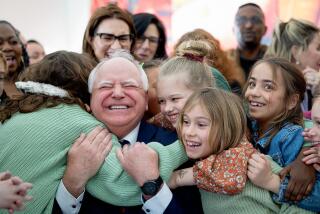In Politics, It’s Movement vs. Mainstream
- Share via
WASHINGTON — All set for the 2000 presidential primaries? There may be more of them than you think. One contest for the Democrats and two for the Republicans. Yes, two GOP races. One to pick the candidate of the mainstream Republicans. The other for leader of the movement conservatives.
The New Hampshire primary picks the winner of each title. Ten candidates go in, two come out. One from column A, one from column B. Then the mainstream candidate typically beats the movement candidate, and it’s all over.
It looks like there’ll be five contenders for the mainstream title next year, with Texas Gov. George W. Bush in the lead. Just about the whole GOP establishment has trekked down to Austin, Texas, to give Bush its blessing. “I am proud of the leaders who have come together to help me explore the prospects of a national campaign,” Bush said on March 7, when he announced the formation of his exploratory committee. On that committee: Haley Barbour, former chair of the Republican National Committee. Bush’s policy advisors include GOP royalty like Dick Cheney, former chief of staff in the Ford White House, and George P. Shultz, President Ronald Reagan’s secretary of state. Mainstreamers are inclusive. They’re the “big tent” Republicans. Former transportation and labor secretary Elizabeth H. Dole was asked, “Would you curtail involvement with international organizations that promote abortion?” Her answer: “A number of these organizations are important to us and to stability around the world, so the answer would be ‘no’ to that.”
Mainstream Republicans are problem-solvers. Big government is the problem. “My campaign will have three basic ideas,” former Tennessee Gov. Lamar Alexander said at his March announcement. “They are: to fix public education; to improve family incomes by lowering taxes and securing Social Security; and to strengthen our national defense.”
Mainstream Republicans are devoted free traders and internationalists. Bush, Dole and Sen. John S. McCain of Arizona all strongly support allied military action in Kosovo, in virtually the same language. McCain: “We need to do whatever is necessary to win.” Bush: “Now that we’re engaged, we must win.” Dole: “I think we have to win this war. Win it, absolutely.” McCain is a maverick competing for the mainstream title. He has challenged the establishment on issues like campaign-finance reform. Which may be why he’s lagging in the polls.
House budget committee chair John R. Kasich of Ohio is another maverick mainstreamer. Kasich’s specialty is pushing the party establishment along. “In 1989, I started to say we should balance the budget. A lot of people in my party said, ‘No way.’ And we got it done,” Kasich boasted. “I said we needed to close loopholes on large corporations. They said, ‘No, we shouldn’t.’ And we got it done.”
Bush is the guy to beat for the mainstream title. Kasich calls Bush “a five-star restaurant nobody’s ever eaten in.” Dole has gender appeal. McCain and Kasich can pull anti-establishment votes. And Alexander? Well, slow and steady sometimes wins the race.
The contest for the movement title looks wide open. That race, too, has five contenders. One old crusader, Patrick J. Buchanan. He took the movement title in the last two campaigns. Plus two rookies, Sen. Robert C. Smith of New Hampshire and former Family Research Council president Gary L. Bauer. If mainstream Republicans argue “We can win,” movement conservatives insist, “We won’t back down.” “I don’t care what the polls say,” Bauer asserted. “I will never sacrifice one American child, born or unborn.”
Movement Republicans fancy themselves as populists. Most challenge the mainstream positions on trade and Kosovo. Smith on Kosovo: “I don’t think we’re meant to be a 911 peacekeeping force.” Buchanan on trade: “With each decade, American becomes addicted to the narcotic of cheap imports.” And on Kosovo: “a Balkan Bay of Pigs.” Two contenders have shifted from the mainstream to the movement. Though he served as vice president, it’s hard for Dan Quayle to run on the argument he can win. So he’s running on a different argument. “What is the greatest challenge facing America today?” Quayle said when he announced his candidacy. “Is it jobs, or is it values? It is values. Of course it is.” His emphasis on values puts him in the conservative movement.
Mainstream Republicans weren’t too accommodating to Steve Forbes in 1996, so this time he’s taking them on with his own values pitch. In a speech to conservative activists in January, Forbes denounced “the tragic 26th anniversary of Roe vs. Wade; and the absolute refusal of the Republican establishment to talk about it, much less do something about it.” In the movement crowd, Forbes has the most plausibility because he’s got the most money. But if conservatives want to win enough, they may go with Bush. Many already have.
For movement candidates, no matter how rich, usually can’t get nominated. That’s because the movement base is too small. Only 10% of Republicans describe themselves as “very conservative.”
Among GOP primary voters, however, that base is more than twice as large. On the average, 22% described themselves as “very conservative” in 1996, ranging from 13% in Vermont to 31% in Texas. Among caucusgoers, the number went up to 34% in Iowa. Even though movement conservatives have a stronger voice in primaries and caucuses, they’re rarely a majority. Far from it.
So why does any candidate want to become king of the movement conservatives? Not to get on the ticket. Hard-core conservatives don’t make good vice presidents. They’re more loyal to principles than presidents. They run because lightning may strike. It doesn’t happen often, but it has. Twice--once in each party.
Reagan was the movement candidate against Richard M. Nixon in 1968 and Gerald R. Ford in 1976. Lightning struck in 1980, when Reagan beat the mainstream candidate, George Bush. On the Democratic side, Eugene McCarthy was the first movement liberal to challenge the mainstream, back in 1968, over Vietnam. Four years later, lightning struck McGovern, who beat the mainstream Edmund Muskie for the nomination.
When does lightning strike? When the party establishment is caught in a storm and discredited. As the Democratic establishment was over Vietnam in 1972. And as the GOP establishment was over Watergate and the economy in 1980.
Right now, conservatives believe the GOP establishment has been discredited. “We were betrayed,” Forbes told conservative activists. “Reagan’s brand of pro-growth, pro-freedom conservatism wasn’t enough, we were told. What was needed was a ‘kinder and gentler’ approach, we were told.”
In their view, the GOP lost in 1992 and 1996 because it didn’t nominate true conservatives. “Why was Bill Clinton twice elected president?” Bauer asked fellow conservatives. “It is not because the American people have failed in their moral standards. Ultimately, it is because the Republican Party has twice failed to give the American people a good enough alternative.” Amazingly, even a candidate on the 1992 ticket joins in the condemnation. “Let’s make this pledge right now,” Quayle told conservatives. “No more timid, themeless, issueless, ‘me-too’ campaigns.” (“Like whose?” one had to wonder.)
When movement conservatives win, it’s not because of ideology. It’s because of anger at the party establishment. And right now, GOP voters don’t seem angry at the establishment. They’re angry at conservatives for pushing the party too far on issues like abortion, gun control and impeachment. There’s no lightning storm forecast for 2000. Is there any possibility the GOP could split? It did in 1980, when Reagan won the nomination. John B. Anderson, a moderate, refused to stay in a party dominated by conservatives. No harm done.
Suppose Bush wins the nomination next year and names a abortion-rights supporter like Pennsylvania Gov. Thomas J. Ridge, as his running mate. Movement conservatives might bolt. Buchanan has warned, “You will start a civil war in that party if you try to take Ronald Reagan’s pro-life plank out of the platform.”
But could the right mount a credible candidate? Remember, Forbes has a lot of money. He could do a lot of harm.
On the Democratic side, Clinton has co-opted the movement liberals who supported Jesse Jackson. Their last gasp was Edmund G. “Jerry” Brown Jr. in 1992.
What about former New Jersey Sen. Bill Bradley’s challenge to Vice President Al Gore? Bradley’s not exactly a movement liberal. Still, many liberals are unhappy with Clinton and Gore. Some see Bradley as a vehicle for their discontent. The most liberal senator, Paul Wellstone (D-Minn.), has endorsed Bradley.
If Gore were to win the nomination and lose the election, the liberal movement could spring back to life, claiming, “The party sold out to Clinton and look what happened. We told you so.”
More to Read
Get the L.A. Times Politics newsletter
Deeply reported insights into legislation, politics and policy from Sacramento, Washington and beyond. In your inbox three times per week.
You may occasionally receive promotional content from the Los Angeles Times.










